Skerries Eco Nights
Support Sustainable Skerries via our PayPal.me page!
Small Steps, Big Impact: Second Skerries Eco Night Encourages Actions for Biodiversity
Biodiversity is an urgent issue that requires action at every level: Individual, household, neighbourhood, town, county, and country. Why? See below!
At the Sustainable Skerries Eco Night:Biodiversity (27 April 2023, Skerries Mills), individuals and representatives from various organisations came together to discuss the biodiversity emergency and explore potential solutions.
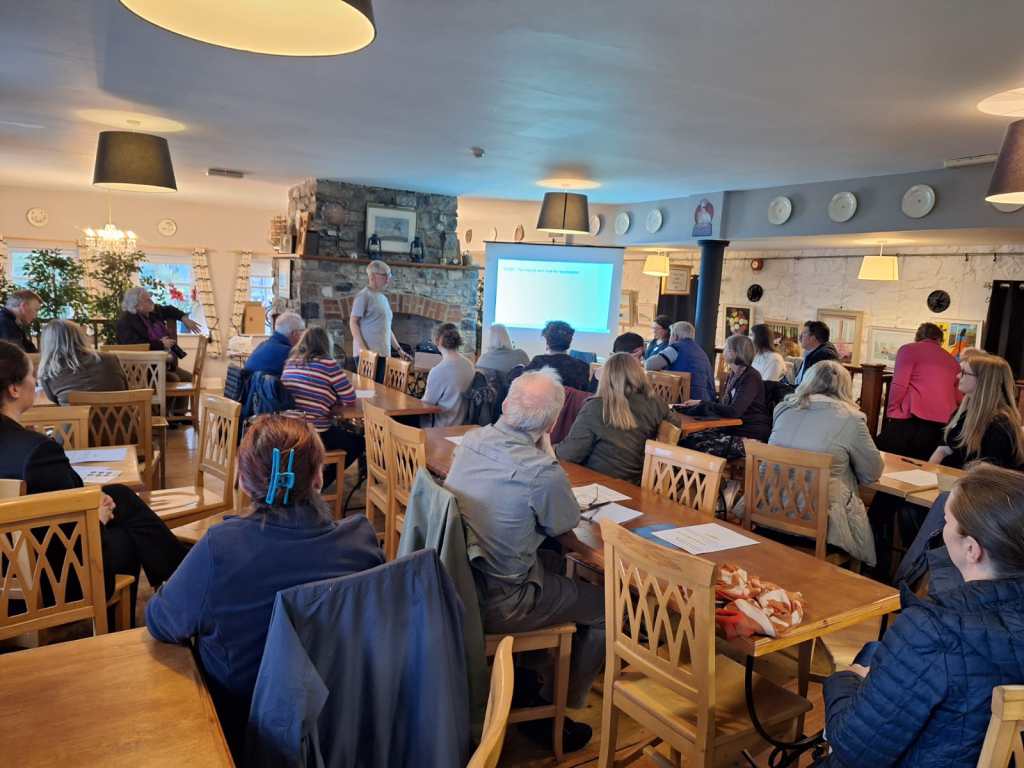
Two presentations set the context. Aileen O’Connor, Senior Executive Parks & Landscapes Officer with Fingal County Council, outlined the complexities involved in moving the operations for the entire county towards a more biodiversity-friendly way than has been the norm.
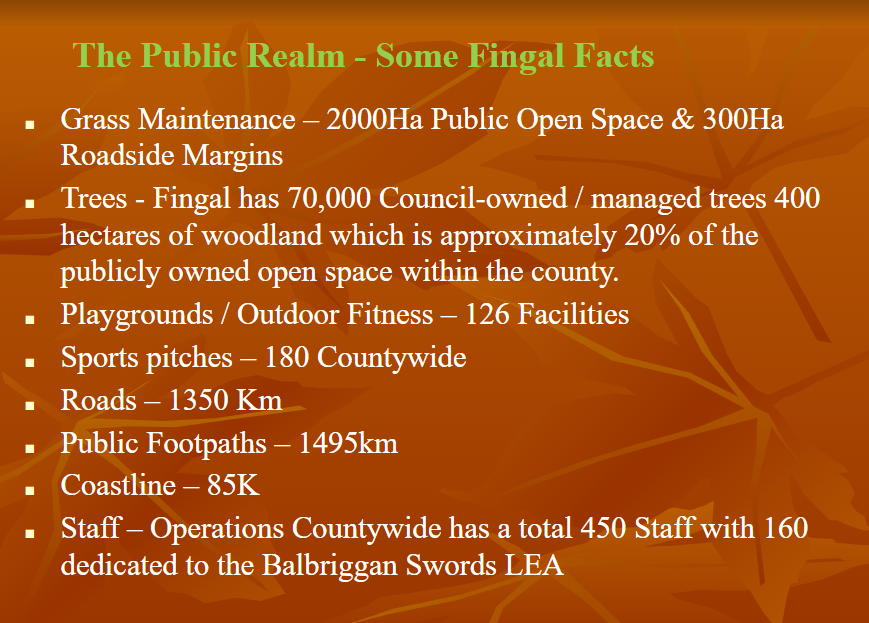
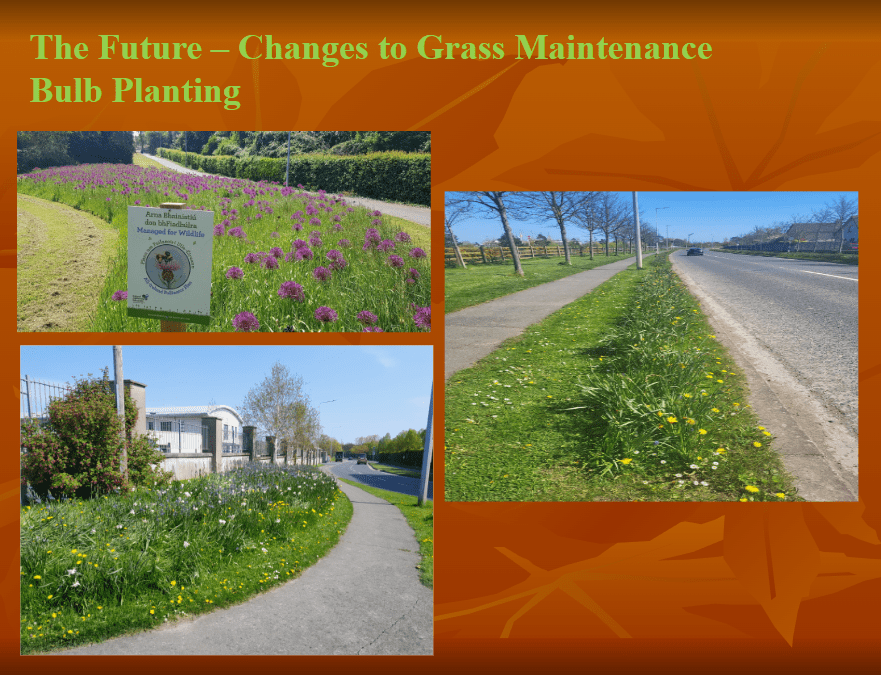

Charlie Heasman, one of the main people in the Sustainable Skerries Biodiversity Team, spoke of the drastic decline in the biomass of insects over the last few decades, as well as the attempts that have been made locally to introduce more biodiversity into Skerries: Reducing mowing in certain areas (in cooperation with Fingal County Council), establishing wildflower meadows e.g. in Skerries Educate Together, planting native hedgerows along walls in a number of local estates, and taking groups, including school groups, on pollinator-focused biodiversity walks.
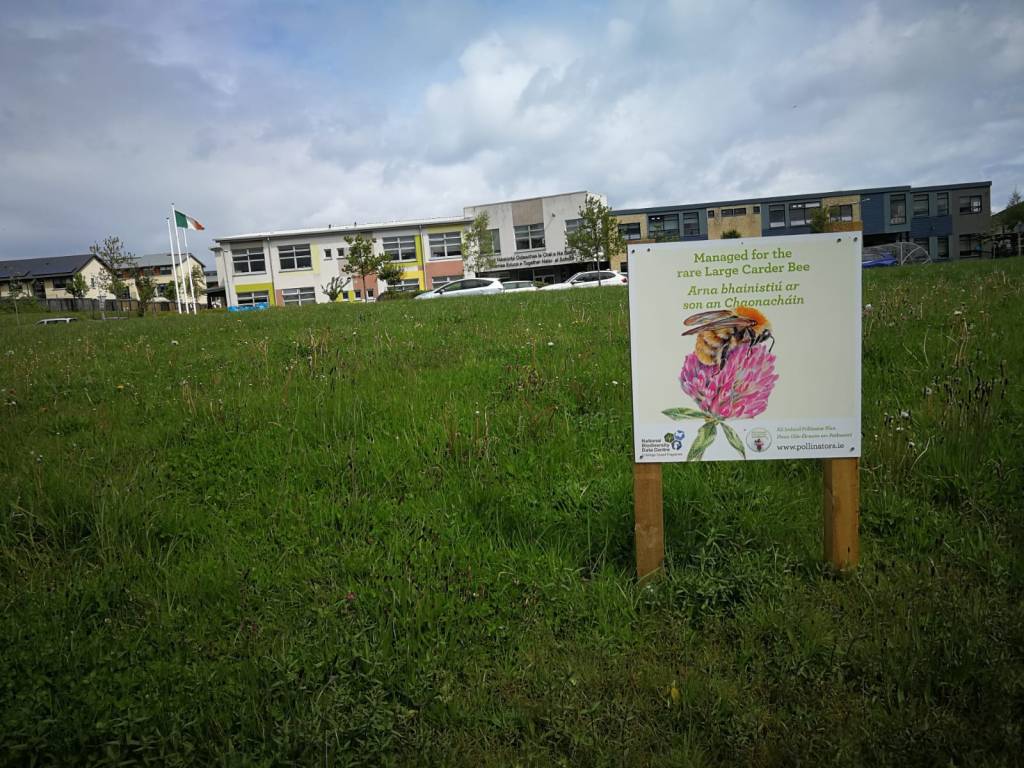
The feedback was unanimous – it was great to have so many different people and groups in one room, plus having Fingal County Council’s Operations division (through Aileen) there, as well as Deborah Tiernan, Fingal County Council’s Biodiversity Officer, was truly invaluable!
The discussions in the second half of the evening generated a number of suggestions for individuals, groups, premises, and the county council, including:
Individuals and Households (Gardens)
– Include more biodiversity in your garden.
– Avoid using herbicides and pesticides, which have a very bad effect on plants, insects, birds, and animals, including humans.
– Participate in No Mow May, and consider having signage in your front garden explaining the purpose of your “neglected” lawn or garden to educate neighbours and prevent misunderstandings.
– Opt for organic food where possible to support nature-friendly farms and encourage more sustainable practices.
See below for more!
Schools
– Include biodiversity education in the curriculum to help students understand the importance of protecting biodiversity and develop good habits early on.
– Create outdoor classrooms and wildlife habitats to provide students with hands-on learning opportunities and encourage biodiversity in the school’s surroundings.
– Implement green policies, such as reducing waste and energy use, to reduce the school’s carbon footprint and support sustainability.
There’s more below!
Public Open Spaces
Notes by Dara. Thank you!
This theme was the central focus of the two presentations on the evening. Charlie Heasman’s talk spoke to the fact that for wildlife to thrive we need to allow growth which means less cutting, mowing and flailing and where feasible additional planting and sowing. Aileen O’Connor’s presentation outlined the scale of the job being managed by Fingal Operations. Aileen made it clear there is change underway that FCC are on a journey in that regard but that it will take some time.
For wild flowers to thrive cut grass must be removed to avoid the soil becoming too fertile which favours grasses. Removal of cuttings is a challenge as the question arises of where they should be put and there is significant added cost in doing so.
In Ardgillan a local farmer cuts and removes grass for use as silage. However grass in smaller areas such as in urban areas (estates, smaller parks) is not of sufficient volume to interest farmers and is very often contaminated with plastic and metal litter, often shredded by mowers into small fragments. No farmer wants to feed cattle plastic and metal. It was suggested that volunteers like TidyTowns could litter pick grass areas in advance of mowing but this has been discussed previously and TT can’t scale or commit to cover the 26 or so grass areas currently cut by FCC in Skerries.
The idea of bio-digesters for large volumes of cuttings was mentioned.
We discussed the idea of community groups purchasing or hiring their own cut and lift machinery to manage meadow areas on public land. Aileen said the cost of insurance cover (for millions of euro) would be prohibitive.
It was pointed out that while for a biodiversity-friendly audience reduced cutting, mowing, flailing is desirable other parts of communities take opposing views and want everything cut back for a “neat” appearance. It was also pointed out that unmanaged hedges and trees can lead to “anti-social behaviour” in such areas. Charlie pointed out however that trees do not cause such behaviour but merely provide cover for it.
In Balbriggan a pilot project has been started where community groups like Balbriggan TidyTowns were able to nominate grass areas for a reduced mowing regime. This got off to a bumpy start when areas were mowed regardless but it is hoped that won’t happen again. This project will inform grassland management in other parts of Fingal.
In the context of Skerries it was agreed that the forthcoming ecological study of the town park by Dr. Niamh Burke from Coiscéim Consulting would greatly help in agreeing a plan for mowing, cutting and flailing of hedges and stream banks and possible new meadow creation.
FCC have a strong preference for working off written plans, especially plans with the widest possible community buy-in.
Actions:
- SuSk and STT should have an agreed list of areas for reduced mowing, cutting, flailing and suggested areas for “rewilding” / meadow creation.
- All interested parties to give input to Dr. Niamh Burke from Coisceim Consulting for ecological study of town park in Skerries.
- Skerries stakeholders should await outcome of Balbriggan mowing pilot and FCC grasslands management plan.
Political Action
– Write to your local, national, and European representatives to express your concerns about biodiversity and urge them to take action to protect it.
– Support local initiatives, such as Sustainable Skerries, that work to promote biodiversity-friendly practices and policies.
– Advocate for policies that promote sustainability and biodiversity, such as funding for green infrastructure and regulations to limit pesticide use and promote organic farming – individually or in a group, such as Sustainable Skerries
Join us!
Taking small steps consistently can make a significant difference in protecting biodiversity. If you’re interested in getting involved with Sustainable Skerries or learning more about our efforts to promote biodiversity, you can contact us at sustskerries@gmail.com.
Some more background and information
Why biodiversity is so important
Ireland has a diverse range of habitats, from coastlines to bogs, and is home to a wide variety of plant and animal species, including many that are endemic or unique to the island. These species and ecosystems provide a range of important ecosystem services, such as clean air and water, pollination, and soil fertility, which are essential for human well-being and economic activity.
However, Ireland’s biodiversity is under threat. The Biodiversity Citizens’ Assembly, established in 2017, highlighted the scale of the crisis, noting that almost one-third of Ireland’s 97 native bee species are threatened with extinction and that many other species are in decline. The report of the Assembly made a number of recommendations for action, including the need for better protection of key habitats and ecosystems, stronger regulation of pesticides and other harmful chemicals, and increased funding for biodiversity conservation and restoration.
The loss of biodiversity has serious implications for Ireland’s economy, as well as its environment. For example, the decline in pollinator populations threatens the production of crops that rely on pollination, such as apples, strawberries, and oilseed rape, which are worth over €50 million to the Irish economy annually. Similarly, the decline in wild salmon populations has significant implications for the recreational fishing industry, which generates over €200 million in revenue each year.
In addition, biodiversity loss can have significant cultural and social impacts, particularly for rural communities. Many traditional practices, such as hay meadow management, are dependent on maintaining a diverse range of plant species, and the loss of these practices can have wider impacts on rural heritage and traditional knowledge.
[This section is based on a response from ChatGPT.]
Your Back Garden: Five top tips to bring more biodiversity to your back garden
- Plant for biodiversity: Choose plants that attract and support local wildlife such as bees, butterflies, and birds. Opt for open-flowering perennials and plants with umbelliferous flowers.
- Avoid pesticides and herbicides: These chemicals harm beneficial insects and pollinators, and can also enter the food chain and harm wildlife and people.
- Embrace “messiness”: Avoid over-tidying your garden and create habitats for wildlife by leaving some areas untamed. Ivy, for example, is a great plant for nesting birds and feeding pollinators.
- Consider alternatives to traditional bedding plants: Many traditional bedding plants are not bee-friendly, so choose plants that are labelled as bee-friendly or opt for native plants.
- Connect with others: Join local community groups, such as the Gardening for Pollinators WhatsApp group run by Sustainable Skerries, to share knowledge and skills with like-minded people.
And here are some resources and websites that have more information:
- Gardening for Biodiversity – Create a Haven for Wildlife | Fingal County Council
- Gardens » All-Ireland Pollinator Plan
Schools and Biodiversity: Possible Actions in Skerries
- Create an outdoor classroom within the town park that all schools could avail of and book through Skerries Mills. This will provide an immersive experience of nature and an opportunity to learn in an outdoor setting. Who? Fingal County Council together with Skerries Mills
- Promote walking buses to school to help reduce traffic congestion in the town. This initiative would have other benefits to students such as exercise, social interaction, and connecting with their local environment both natural and manmade.Who? Sustainable Skerries together with Skerries Cycling Initiative
- Integrate a biodiversity mindset into the school buildings and grounds. Ensure sustainability by incorporating facilities management and the day-to-day running of the school to visibly highlight the importance of protecting and enhancing biodiversity. Wildlife gardens, nest boxes for birds and bats, recycling, water and energy conservation are some examples. Who? Skerries Tidy Towns (who are already engaged in this area), together with the Men’s Shed.
- Create projects for transition year students that increase awareness of biodiversity and the food chain. This could involve creating opportunities for students to connect with nature, appreciate its importance and take action to help. Simple things like nesting boxes and bug hotels that do not need maintenance during school holidays can be initiated, and the Herb Patch Project for schools can be promoted. Who? Skerries Tidy Towns (who are already engaged in this area)
Further resources / websites
1. What can we do in our front / back gardens / on our balconies to improve biodiversity? https://pollinators.ie/gardens/ as well as Gardening for Biodiversity – Create a Haven for Wildlife | Fingal County Council
2. What residents’ associations / neighbourhood groups do to improve biodiversity? https://pollinators.ie/communities/
3. What can schools do to improve biodiversity? https://pollinators.ie/schools/
4. What can sports clubs / community centres do to improve biodiversity? https://pollinators.ie/sports-clubs/
5. What can farming / food production / our consumer choices regarding food do to improve biodiversity? https://pollinators.ie/farmland/ & https://pollinators.ie/businesses/
National Biodiversity Data Centre
The National Biodiversity Data Centre’s website provides information on Ireland’s biodiversity and offers resources such as ID guides and citizen science projects.
Green-Schools Ireland provides resources and support for schools to become more sustainable and promote biodiversity through their programs.
EPA: Latest Biodiversity Reports
The Environmental Protection Agency’s website offers information and resources on biodiversity in Ireland, including tips on how individuals can take action to protect it.
BirdWatch Ireland provides information and resources on Ireland’s birds and their habitats, as well as ways to get involved in bird conservation efforts.
National Parks & Wildlife Service
The National Parks and Wildlife Service’s website provides information on Ireland’s wildlife and protected areas, as well as resources for individuals and groups looking to get involved in conservation efforts.
Context: Biodiversity Plans
- Large Carder Bee Biodiversity Action Plan 2021 – Sustainable Skerries based on work by Simon Barron of BEC Consultants. Supported by FCC and Skerries TidyTowns
- Biodiversity Action Plan for Skerries by Wildlife Surveys Ireland 2021. Prepared for FCC, with input and support from Skerries Tidy Towns & Sustainable Skerries
- (Draft) Fingal Biodiversity Action Plan 2022-2030 (version: May 2022)
- Recommendations of the Citizens’ Assembly Report on Biodiversity Loss (2023)
Previous Eco Nights
The First Skerries Eco Night, November 2022
The first Skerries Eco Night took place on Tue 22/11/2022 in Skerries Mills. Read a full report here: “The first Skerries Eco Night will not be the last” – including slides, inputs, and further links.
And what can we do in Skerries? Here are just a few suggestions from the night.
- yourself: Subscribe to the Sustainable Skerries Newsletter to be kept informed of future events and opportunities to get involved!
- your household: Check windows for drafts, and create a wildflower front garden
- your neighbourhood: Make sure your road does not lose out on information! Are you part of Skerries Neighbourhoods Network? See https://www.skerriesca.com/hom/neighbourhoods-network/ for a list of areas that are already in it. If you don’t have a network in your road, use the tips on how to set one up!
- your kids’ school: Swap as many things as possible, toys, uniforms, party equipment, bikes… many of these will already be happening. Be active in your parents’ association and help them along.
- your business: How can you nudge customers towards more eco-friendly choices? Make it easy for those who bring bring cups, reuse packaging, opt for organic / plant based. And check your energy use – how can you help the climate while saving money? Get in touch with S-SECI!
- any group you’re in… Make sure that biodiversity and climate action underpin everything you do. Share lifts. Avoid single use. Reduce energy consumption. Plan for the future. Grow some wild plants.
Our next plan is to have a series of focused events, starting with Skerries Eco Night: Biodiversity on Thurs 27 April, and then the first Skerries Eco Festival Fri 1-Sun 3 September.
Do keep an eye on this page, where we will post more information and outcomes over the next couple of weeks. 💚 This is a great result, and very promising for Skerries!
Here is the original invite:
Dear friends,
The vision of the Skerries Community Association (SCA) is to “safeguard and enhance all that is good about our community and environment.”
Never before has this been as important as it is now, given the challenges the planet faces.
So how can we here in Skerries tread more lightly into the future?
To explore this, we would love you to join us at our first Skerries Eco Night, to be held on Tuesday 22 November 2022 in Skerries Mills, starting at 8 pm sharp.
This will be an enjoyable opportunity to learn more about existing and future eco initiatives in our community, and what they have to offer you and your organisation / group / club / friends / family.
Please confirm that you hope to join us by clicking this link as Skerries Mills need to know the numbers for refreshments:
…
Jane Landy, chair, The Skerries Community Association CLG
Sabine McKenna, chair, Sustainable Skerries

The Skerries Eco Night 2022 Presentation
Click on the link below to open the presentation in your browser.
A Little Background
This event is one of the outcomes of our recent Skerries Eco Town Training Course, attended by over twenty people from a number of local groups.
We secured funding through LEADER for this course, which has given us this unique opportunity to offer a six-week online course in combination with a weekend visit to Cloughjordan, Ireland’s eco village. More details are in this blogpost. We will put our main take-aways into a separate blogpost soon.
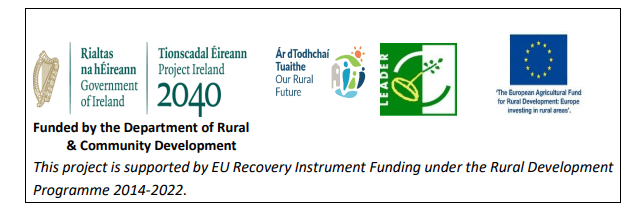
– The European Agriculturan Fund for Rural Development: Europe investing in rural areas –
and the Irish Department of Rural and Community Development.

